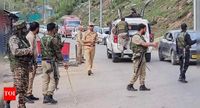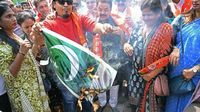MUMBAI: In the aftermath of a tragic terrorist attack in Pahalgam, Kashmir, that left 26 people dead and several others injured on April 22, 2025, various Muslim organizations have united in condemnation of the violence. The Indian Muslims for Secular Democracy (IMSD), along with the Bebaak Collective, Bharatiya Muslim Mahila Andolan (BMMA), Centre for Study of Society and Secularism (CSSS), Citizens for Justice and Peace (CJP), and Wisdom Foundation, issued a joint statement expressing their heartfelt condolences to the families of the victims.
According to reports, the attack was claimed by The Resistance Front (TRF), a shadow group associated with the banned Pakistan-based Lashkar-e-Taiba (LeT). In their statement, IMSD convenor Javed Anand emphasized the need for urgent and adequate compensation for the victims' families and proper treatment for those injured. "We hope that the perpetrators are swiftly apprehended, brought to justice, and handed severe punishments," Anand stated.
The attack struck at the heart of Pahalgam, a popular tourist destination in the Kashmir Valley, raising serious concerns about the region's security and the so-called "return of normalcy" following years of conflict. The organizations involved have consistently opposed the targeting of innocent civilians, regardless of the justifications offered for such acts of violence.
In light of the tragedy, the organizations called for a thorough inquiry into the security lapses that allowed such an attack to occur. Anand noted that the latest mass killing raises disturbing questions about the effectiveness of security agencies in protecting both locals and tourists in a region that has long been a target for terrorist groups.
On April 23, the day after the attack, the entire Kashmir Valley observed a complete bandh, with shopkeepers, traders, and transporters ceasing their activities in solidarity with the victims. Reports emerged of mosques opening their doors to assist distraught tourists, while local religious leaders condemned the attack as an assault on humanity itself. Kashmiri newspapers conveyed their grief, declaring a day of mourning for the lives lost.
IMSD and its allies urged all media outlets, particularly television channels, to report on the developments objectively and avoid sensationalism. They called on all Indians, regardless of their faith, to emulate the communal harmony displayed by ordinary Kashmiri Muslims during this time of grief.
In a broader context, the Pahalgam attack has reignited fears among Muslims in India about potential retaliatory violence. Many social media users expressed concerns about possible reprisals against Muslim communities in the wake of the attack, drawing parallels to the historical treatment of Muslims during times of heightened tension. The incident has sparked a frenzy of discussions online, with some calling for an "Israel-like solution" to the conflict in Kashmir, raising alarms about the potential for increased violence.
Social media platforms were flooded with images and messages highlighting the bravery of local Kashmiris who risked their lives to protect tourists during the attack. One Kashmiri man, Adil Hussain Shah, was killed while attempting to disarm one of the gunmen, and his actions were praised by Jammu and Kashmir's Chief Minister, Omar Abdullah, who visited Shah's family to offer condolences and support.
As the international community reacts to the attack, the Indian government has taken steps to downgrade its diplomatic ties with Pakistan, suspending the Indus Waters Treaty in response to the incident. However, there is currently no evidence linking the attackers directly to Pakistan, despite the historical context of the long-standing conflict over Kashmir.
The region itself has been a flashpoint for tensions between India and Pakistan since the partition of the subcontinent in 1947. Kashmir, claimed by both nations, has been the site of multiple wars and ongoing insurgency, with India accusing Pakistan of supporting militant activities in the area. The recent attack is the deadliest in nearly two decades, raising alarms about the security situation in a region often described as the world's most militarized zone.
In the wake of the attack, prominent Muslim organizations have reiterated their condemnation of terrorism in all forms. Imam Umer Ahmed Ilyasi, head of the All India Imam Organisation, called for imams across India to deliver strong anti-terror messages during Friday prayers. He emphasized that killing innocent people in the name of religion goes against the very tenets of Islam.
Jamiat Ulema-e-Hind president Maulana Arshad Madani also condemned the attack, labeling it a cowardly act and asserting that there is no place for terrorism in Islam. He noted that the ordinary people of Kashmir have displayed a strong desire for peace and harmony, as evidenced by their collective condemnation of the violence.
As the investigation into the attack unfolds, many are calling for accountability and transparency from both state and central authorities. Jamaat-e-Islami Hind (JIH) president Syed Sadatullah Husaini expressed deep sorrow over the loss of lives and called for swift justice for the victims.
While the immediate aftermath of the attack has been marked by grief and outrage, it also serves as a reminder of the complex and multifaceted nature of the conflict in Kashmir. As tensions rise, the hope remains that the voices of peace and communal harmony will prevail over the forces of division and violence.





